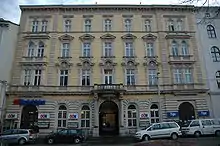Oberösterreichische Nachrichten
The Oberösterreichische Nachrichten (OÖN) (German pronunciation: [ˈoːbɐˌʔøːstəʀaɪ̯çɪʃə ˈnaːχʀɪçtən] ⓘ) is a German language regional newspaper published in Linz, Austria.
 | |
| Format | Broadsheet |
|---|---|
| Publisher | Wimmer Medien |
| Founded | 11 June 1945 |
| Political alignment | Independent |
| Language | German |
| Headquarters | Linz |
| Circulation | 127,139 (2018) |
| Website | Oberösterreichische Nachrichten |
History and profile

OÖN was established by the US forces occupying Austria after World War II.[1][2] The first issue was published on 11 June 1945.[3] The paper has its head office in Linz.[3][4] The publisher of the paper is the Wimmer Medien.[5][6] The daily is published in broadsheet format and has an independent political leaning.[7]
Circulation
OÖN was the fifth best selling Austrian newspaper in 2002 with a circulation of 132,000 copies.[5] The paper had a circulation of 123,470 copies in 2003.[8] It was the fourth best selling newspaper in Austria with a circulation of 129,000 copies in 2004.[9]
The circulation of OÖN was 140,000 copies in 2007.[10] It was the fifth best selling newspaper in the country in 2008[7] with a circulation of 140,196 copies.[11] In 2009 the paper had a circulation of 137,947 copies.[11] The average circulation of the paper was 134,493 copies in 2010.[11][12] The paper had an average circulation of 127,000 copies in 2013.[1] It sold 127,139 copies in 2018.[13]
References
- "Austria 2013". WAN IFRA. Retrieved 25 February 2015.
- "Austria Press". Press Reference. Retrieved 18 April 2015.
- Oliver Rathkolb (2010). The Paradoxical Republic: Austria 1945-2005. New York; Oxford: Berghahn Books. p. 143. ISBN 978-1-78238-396-3.
- "Impressum." (Archive) Oberösterreichische Nachrichten. Retrieved 4 August 2013. "OÖ. Online GmbH & Co.KG. 4010 Linz, Promenade 23"
- "World Press Trends" (PDF). World Association of Newspapers. Paris. 2004. Retrieved 8 February 2015.
- "Austria: Top daily newspapers". Publicitas. 28 October 2010. Archived from the original on 4 February 2015. Retrieved 4 February 2015.
- Lisa Müller (2014). Comparing Mass Media in Established Democracies: Patterns of Media Performance. Basingstoke; New York: Palgrave Macmillan. p. 224. ISBN 978-1-137-39138-4.
- The Europa World Year Book 2003. Vol. 1. London; New York: Europa Publications. 2003. p. 606. ISBN 978-1-85743-227-5.
- "Media pluralism in the Member States of the European Union" (PDF). Commission of the European Communities. Brussels. 16 January 2007. Retrieved 27 March 2015.
- Anne Austin; et al. (2008). "Western Europe Market & Media Fact" (PDF). ZenithOptimedia. Archived from the original (PDF) on 5 February 2015. Retrieved 8 April 2015.
- "National Newspapers". International Federation of Audit Bureaux of Circulations. Retrieved 5 March 2015.
- "Western Europe Media Facts. 2011 Edition" (PDF). ZenithOptimedia. Retrieved 6 March 2016.
- Manuela Grünangerl; Josef Trappel; Tales Tomaz (2021). "Austria. Confirmed democratic performance while slowly digitalising". In Josef Trappel; Tales Tomaz (eds.). The Media for Democracy Monitor 2021: How leading news media survive digital transformation. Vol. 1. Gothenburg: Nordicom, University of Gothenburg. p. 99. ISBN 978-91-88855-42-8.
External links
- (in German) Official website